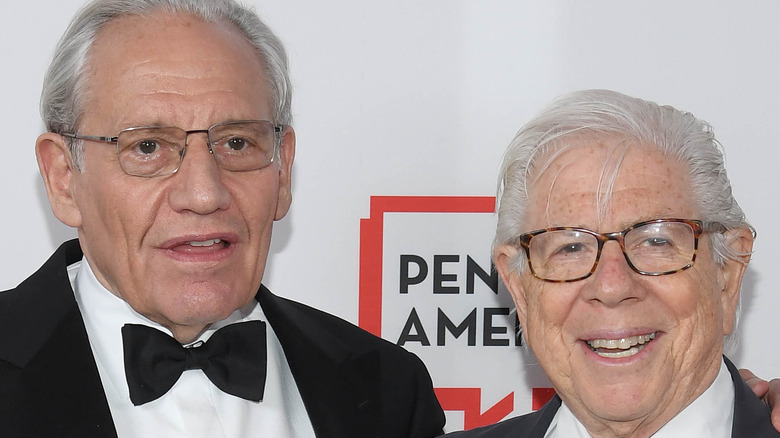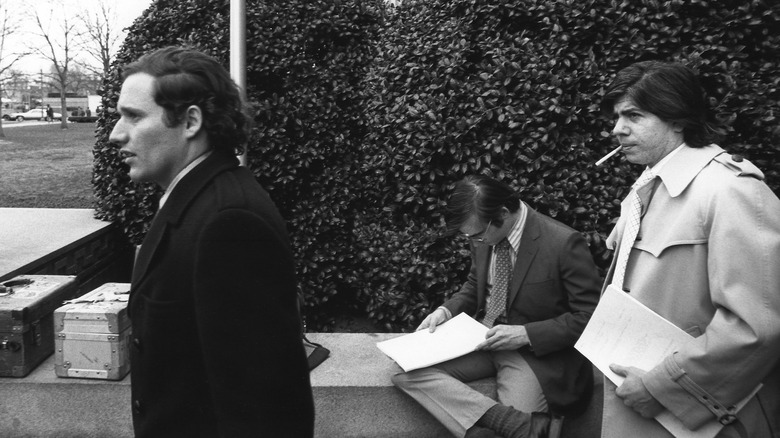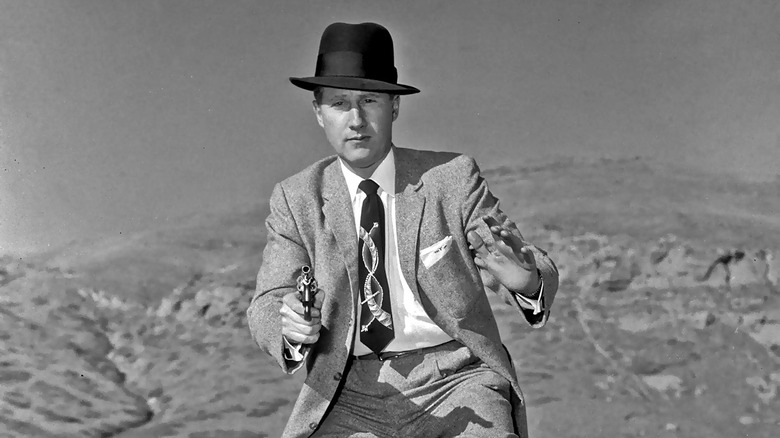The Truth About Woodward And Bernstein's Role In The Watergate Scandal
It was the scandal that led to the forced resignation of the President of the United States. It marked the low point in a country's trust and respect for the highest office of the land and left the nation to question its very foundation. And it was the origins of the tradition of every scandal after having the suffix, "gate" added onto it at the end of its title to stress how important it is.
The Watergate scandal began in May 1972, when members of President Richard M. Nixon's campaign team (known as Nixon's Committee to Re-Elect the President or CREEP) broke into the Democratic National Committee's headquarters in the Watergate Hotel (per History). The team stole top-secret documents and wiretapped the phones to listen to conversations. However, the wiretapped failed to work properly and on June 17, five of the men broke back into the DNC's office in the Watergate Hotel. This time though, a security guard noticed that multiple latches on the doors were taped so they wouldn't lock and called the police, who caught the men in the act.
President Nixon attempted to use the office of the presidency to cover up the crimes and his involvement with any break-ins. These actions would lead to his resignation in August 1974. Following the 1972 arrests, journalists Bob Woodward and Carl Bernstein of The Washington Post investigated the scandal relentlessly. Thanks to their investigation and reporting, the American people had a deep look into Nixon's role in the break-ins and cover-ups.
Bob Woodward and Carl Bernstein were not the first to cover the story
The duo of Bob Woodward and Carl Bernstein have become synonymous with reporting the comings and goings of the Watergate scandal. The first report featuring the now legendary journalists came on June 19, 1972, two days after the break-ins and arrest of the conspirators (via Constitution Center). A day prior, another Washington Post journalist got the first swing at what would become the story of the decade.
Alfred E. Lewis, a veteran police reporter for the newspaper, wrote the first story of the break-ins at the Watergate Hotel a day before the first Woodward and Bernstein article. He was also integral in finding vital evidence and information at the scene of the crime (per Mental Floss). In his obituary column written in 1994, writer Martin Weil had this to say about the late Lewis:
"A familiar and trusted figure to top police officials, [Lewis] went into the building with investigators and remained there unchallenged through the day, gathering information available to no other news outlet."
Editors at the WaPo said that Lewis' early reporting and evidence findings are what convinced them that the story was greater than a simple break-in. Bob Woodward said that Lewis "laid the foundation for what the paper was able to do in reporting the story." Lewis was with the Post from 1935 until his retirement in 1985. He was affectionately known as "Uncle Al" and had many sources in police departments.
The Duo used their Strengths to work in tandem
The best duos complement the other's strengths. On stage, Dean Martin was the suave crooner while Jerry Lewis was the lovable buffoon. Together, they became Hollywood icons. For the team that took down President Nixon, Bob Woodward and Carl Bernstein followed this format to a tee.
Bob Woodward was born to a conservative family in the Midwest (via CBS News). His father was a judge and Woodward eventually entered the Navy after graduating from Yale. He started working for the Washington Post in 1971, nine months before the Watergate break-in. On the other hand, Carl Bernstein was the child of two Communist activists (per Washingtonian). As a teen, he was a "pool shark," a leader of the Jewish service organization B'nai Brith, and a copyboy at The Washington Star. He dropped out of the University of Maryland and became a reporter in New Jersey where his investigative reporting caught the eye of the Washington Post, which hired him in 1966 (via Huffington Post).
Author Alicia Shepherd said about the pair, "They couldn't be more different. But together they did something that neither one of them could do individually. Carl was the big thinker, and Woodward was the one that make sure it got done" (via CBS News). While Woodward interviewed their informant, known as "Deep Throat," Bernstein discovered cash payments from Nixon's reelection campaign in one of the burglar's bank accounts (via The Washington Post). Together, they followed the story and co-wrote the best-seller, "All the President's Men."
Woodward and Bernstein went to great lengths to protect Deep Throat
The third vital member of the team of Woodward and Bernstein is the mysterious figure known as "Deep Throat." The shadowy man was the compass to point the journalist duo in the right direction. An informant in the federal government, it was not until 2005 that the public finally put a name on Deep Throat. William Mark Felt, the former FBI Deputy Director finally announced to the public his identity as Deep Throat, with Woodward and Bernstein confirming this fact (via History). Before this, the three men went to great lengths to hide Felt's identity.
Between June 1972 to November 1973, Felt spoke with Bob Woodward 17 times, originally confirming leads the pair found, but eventually, began to offer new information to the team. Sometimes, Felt would speak on the phone, but on other occasions, he would meet Woodward in a parking garage in Virginia. Despite this, the Nixon White House became suspicious that Felt was leaking information to the press. Woodward and Bernstein never disclosed any information or provided hints about Deep Throat and spoke about him in vague terms in their book, "All the President's Men."
Still, Felt resigned from the FBI in June 1973 after he was suspected of leaking information to The New York Times. While Bernstein was surprised by how mythical Deep Throat became in American pop culture, he remains as much of a part of the Watergate story as Woodward and Bernstein.



